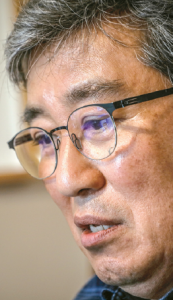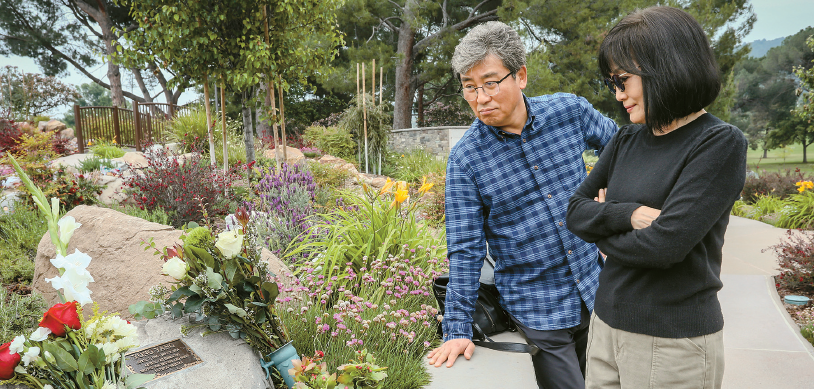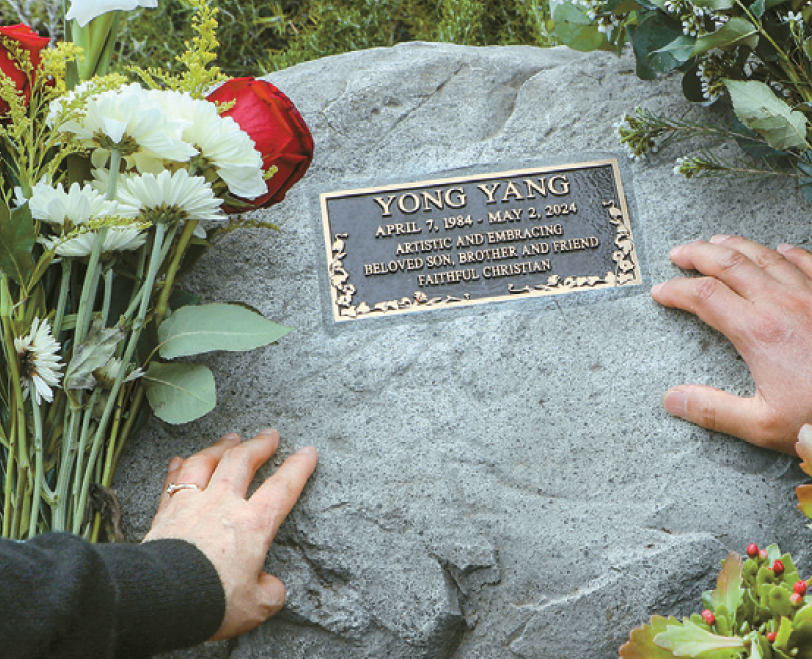One Year After Police Shooting: Grief Turns Into a Fight for Justice
One year after LAPD officers fatally shot his son Yang Yong (40 at the time), father Yang Min remains engulfed in grief—and is demanding accountability and systemic reform. “This sorrow I feel is punishment for failing to protect my son,” said Yang, a well-known education consultant, in an interview at his Los Angeles home—the very place where the shooting took place.
Yang’s pain remains frozen on May 2, 2024, the day his son was killed. Despite replaying every decision—whether he should not have called mental health services or should have turned the police away—nothing can bring Yang Yong back. “We are fighting for truth and justice, but it’s a lonely, exhausting battle,” Yang said.

No Accountability Despite a Death
Yang expressed deep frustration that no one has been held responsible for his son’s death. The sofa where Yang Yong fell after being shot remains in place as a stark reminder. “If even the parents don’t fight, an unjust death will be forgotten,” he said, voicing disappointment at what he called the Korean American community’s silence. Feeling isolated, the family chose not to hold a one-year memorial, citing the community’s lack of engagement.
Not About Compensation: Demanding LAPD Change
Yang emphasized that his fight is not about financial compensation but about forcing the LAPD to acknowledge wrongdoing and prevent future tragedies. His son is buried at Forest Lawn Memorial Park in Hollywood Hills, where they once hiked together. “I hope Yong finds peace there, listening to the stream beside his grave,” Yang said.

Deepening Anger Over LAPD Failures
Yang said the tragedy exposed systemic problems. “I didn’t realize until my son’s death how often innocent people are killed by police in this society,” he said. While institutional rules may seem sound, Yang argued, “the people running the system are the problem.” He pointed out that between 2000 and 2024, no LAPD officer was indicted in an officer-involved shooting case, raising doubts about accountability.
Yang continues to watch body camera footage and review case documents daily, forcing himself to focus on timelines and police actions rather than his son’s image. “It’s heartbreaking, but I have to keep doing it for truth and justice,” he said.
Frustration With Community and Consulate Response
Yang said early support from the community gave way to silence. “The Korean American community’s lack of response has been heartbreaking,” he said, adding that even the Korean Consulate provided only symbolic gestures without practical help.
Yang believes the erosion of unity in the Korean American community has played a role, as people are now more spread out and generational divides make collective action harder. “Many Korean Americans born in the U.S. seem to believe you shouldn’t challenge the system,” he noted.
Legal Advice and Public Criticism
Yang shared that many lawyers told him it would be difficult to change the police system and advised him to seek the maximum compensation instead. But Yang rejected that notion. “From the beginning, this was never about money. Those kinds of comments only deepen my despair,” he said.
He also slammed harsh online comments such as “He deserved to be shot” and “The police did the right thing,” calling them reckless and cruel. “They refuse to examine the real issue—the system itself. Anyone could become the next Yang Yong if this continues,” he warned.
Mental Health Official’s Mishandling Deepens Anger
Yang singled out Yoon Soo-Tae, a Korean American employee of the LA County Department of Mental Health, accusing him of mishandling the situation from the start. “He didn’t try to assess the situation or ask me any questions about my son. He didn’t even attempt to speak with Yong. Instead, he hid behind me at the front door and loudly declared his authority without taking real action,” Yang said, calling the response unprofessional and a key source of his regret.
A House Filled With Memories and Regret
Yang said he regrets everything—from calling mental health services to decisions made the day before the shooting. “I even think, ‘What if we had never immigrated to LA?’” he said, adding that the tragedy made him reconsider how much empathy he had shown others in the past.
Despite the pain, Yang has chosen to stay in the home where his son died. “Leaving would feel like betraying my son. Parents shouldn’t run away from sadness,” he said. “People should know that I’m still living here, grieving every day in the place where my son’s life was taken.”
Everyday Triggers and Lasting Grief
Yang avoids places filled with memories of his son—hiking trails, restaurants, and certain neighborhoods. Most of Yang Yong’s belongings were discarded, though his twin brother kept a few sentimental items, like a hat. “He wears it sometimes to remember his brother,” Yang said.

Ongoing LAPD Accountability Fight: No End in Sight
Yang said there is no timeline for his fight. “Civil lawsuits against the LAPD take at least two to three years, but I’ll keep going however I can,” he said, acknowledging his worries about aging. “But if we don’t fight, my son’s unjust death will fade away. I’ll do everything I can to ensure his death wasn’t in vain.”
No Victory, Only Demands for Change
Yang said he sees no real victory. “We can’t bring Yong back,” he said. His main hope is that the LAPD shows genuine reflection and takes action to prevent future tragedies—something Yang said he has yet to see. “The police need to demonstrate systemic change, but so far, that hasn’t happened.”
A Call for Unity and Better Mental Health Support
Yang urged the Korean American community to build stronger organizations that can advocate effectively. He also called for more open support systems for families dealing with mental illness. “Too many people are ashamed of mental health issues. We need a society that truly takes care of them,” he said.
Remembering Yang Yong
Yang described his son as both pitiable and admirable. “He worked hard to overcome his struggles and even promised us he’d get better the day before he died. He was the most precious son anyone could ask for,” he said.
Related Articles:
- LAPD Officer-Involved Shooting Ruled Justified Despite Violations
- LAPD Judged Itself – McDonnell, the Community Demands Answers
- LAPD Shooting: One Year After Korean American Killed Seeking Mental Health Care, No Reform
BY KYEONGJUN KIM [kim.kyeongjun1@koreadaily.com]



